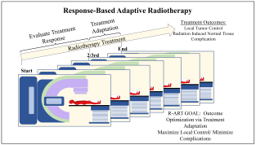
21MB059 Adaptive Radiotherapy: Machine Learning Based App to Optimize Adaptive Radiotherapy Treatment Regimen
Here, we present an Adaptive Radiotherapy Clinical Decision Support (ARCliDS) App for cancer patients. ARCliDS is an AI-driven clinical decision support tool designed to assist physicians in designing an effective radiotherapy treatment plan and optimize decision making against cancer. The goal of the adaptive radiotherapy is to optimize the treatment outcome, i.e., maximize local tumor control and minimize any radiation induced complications.
COMMERCIAL OPPORTUNITY
- Adaptive therapy has shown promise with various cancers, including lung, head & neck, and bladder cancers, to increase the tumor control probability, however, not without controversies. The integration of adaptive radiation therapy (ART), or modifying the treatment plan during the treatment course, is becoming more widely available in clinical practice with supportive technologies such as CBCT or MR-Linacs. ART offers strong potential for minimizing treatment-related toxicity while escalating or de-escalating target doses based on the dose to organs at risk.
- Artificial Intelligence (AI) is a leading trend in the radiotherapy market and is gaining significant popularity in the market. For instance, Varian Medical Systems has recently deployed a completely novel radiation treatment system called EthosTM, a first-of-its-kind system that allows for daily adaptive radiotherapy (DART), such that the treatment for that day can be created on-the-fly based on the patient's current positioning and anatomy. This system is commercially-available and FDA-approved. Several significant mergers have been taken place in the radiotherapy industry. For instance, Siemens Healthineers AG has successfully completed the acquisition of Varian Medical Systems, Inc. However, its true AI potential realization remain limited. It is important to note that Ethos is limited to segmentation and some weight selections compared to Moffitt’s tool that can optimize prescription based on how the patient is responding.
- To genuinely integrate ART into a clinical setting, several clinical trials are underway using EthosTM, with an associated rationale for potential clinical impact. Examples include, a prospective Randomized Phase II Study of daily adaptive radiotherapy in head and neck cancer and a Phase II, multi-center clinical trial for locally advanced cervical cancer for intestinal complication reduction
TECHNOLOGY
An alpha version of ARCliDS was developed using python as backend and R shiny app as the frontend. It is currently designed for Non-small cell lung and liver cancers, however ARCliDS will work, in general, for knowledge-based response-adapted RT treatment. Additionally, the alpha version of the App is also deployed in Moffitt’s internal server for testing and an example of ARCliDS dose recommendation and radiotherapy (RT) outcome for a patient is shown in Figure 1.
The ARCliDS tool is aimed for using in conjunction with the current image guided dose planners. Further, it provides advance machine learning analytics, incorporating patient’s omics (proteomics and genetics) biomarker data along with dosimetric, radiomics, and clinical information. In addition, ARCliDS will also provide physicians with additional treatment related information by inclusion and processing of wider multi-omics data. Overall, ARCliDS will be a part of RT treatment planner to help physician in designing response-adaptive radiotherapy and in estimating treatment response along with outcome.
PUBLICATION/PATENT
Provisional application was filed for Drs. Dipesh Niraula, Issam El Naqa et al., in 2021
The Innovation Office
InnovationMarketing@Moffitt.org
(813) 745-6828

